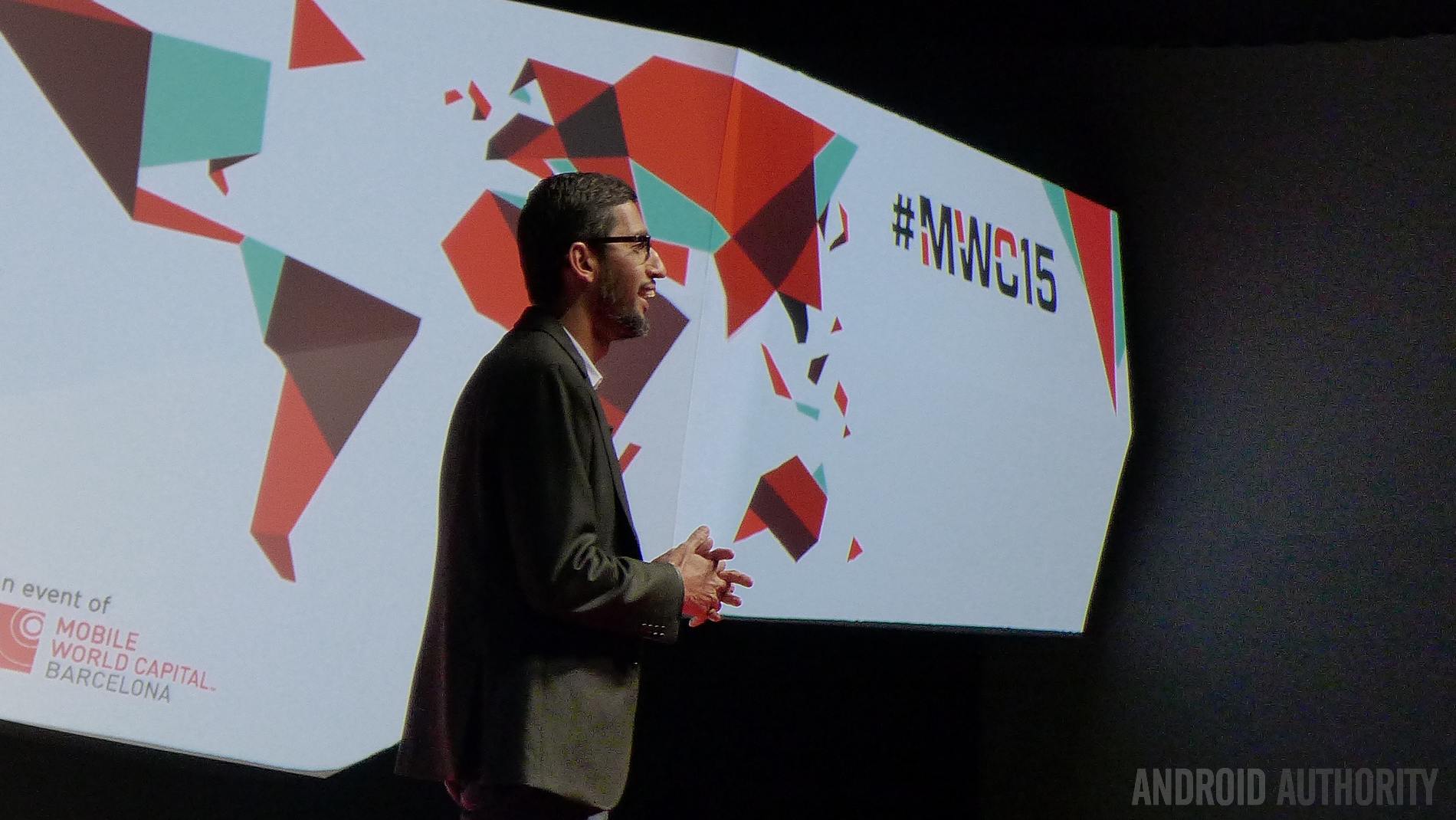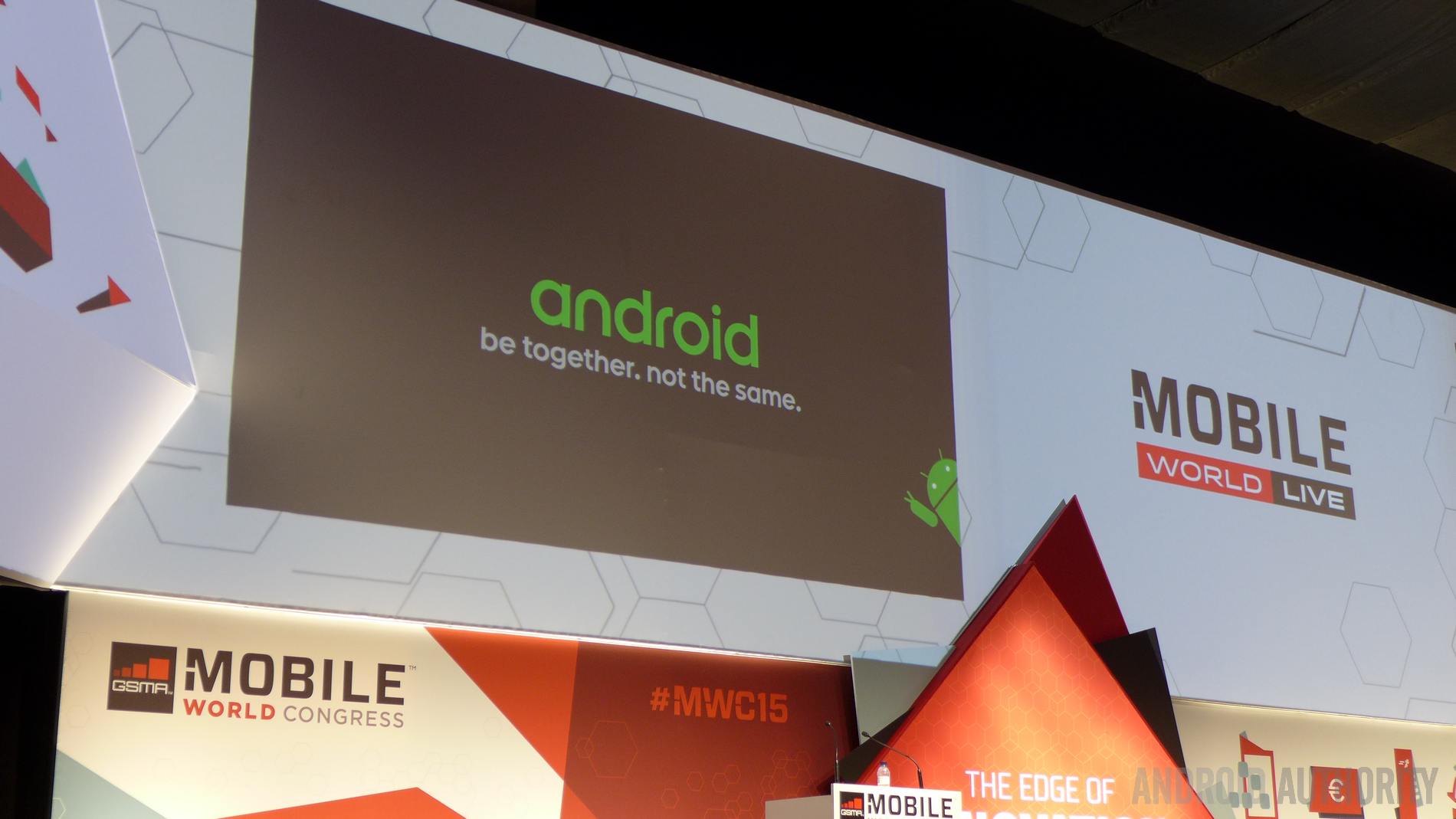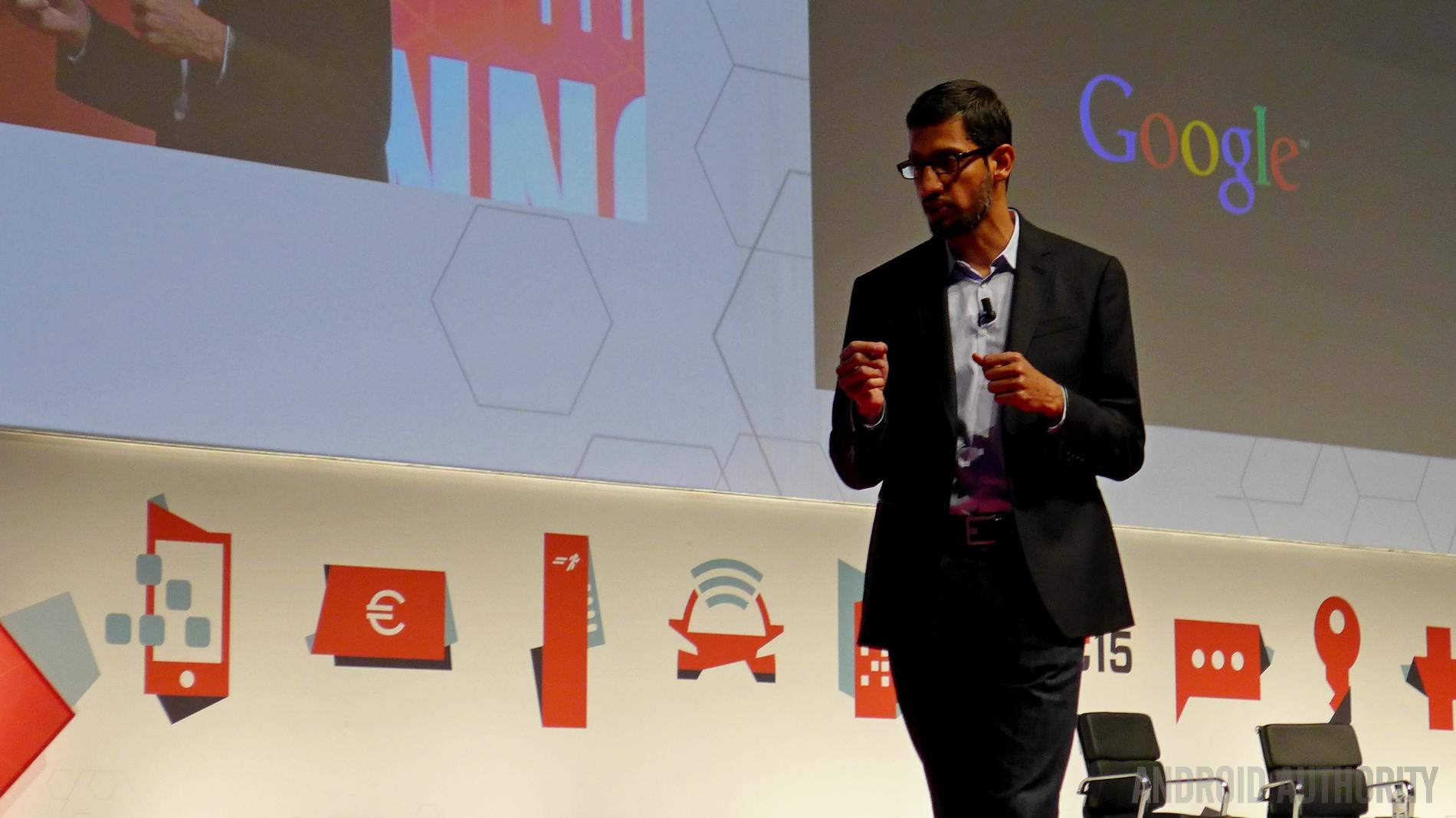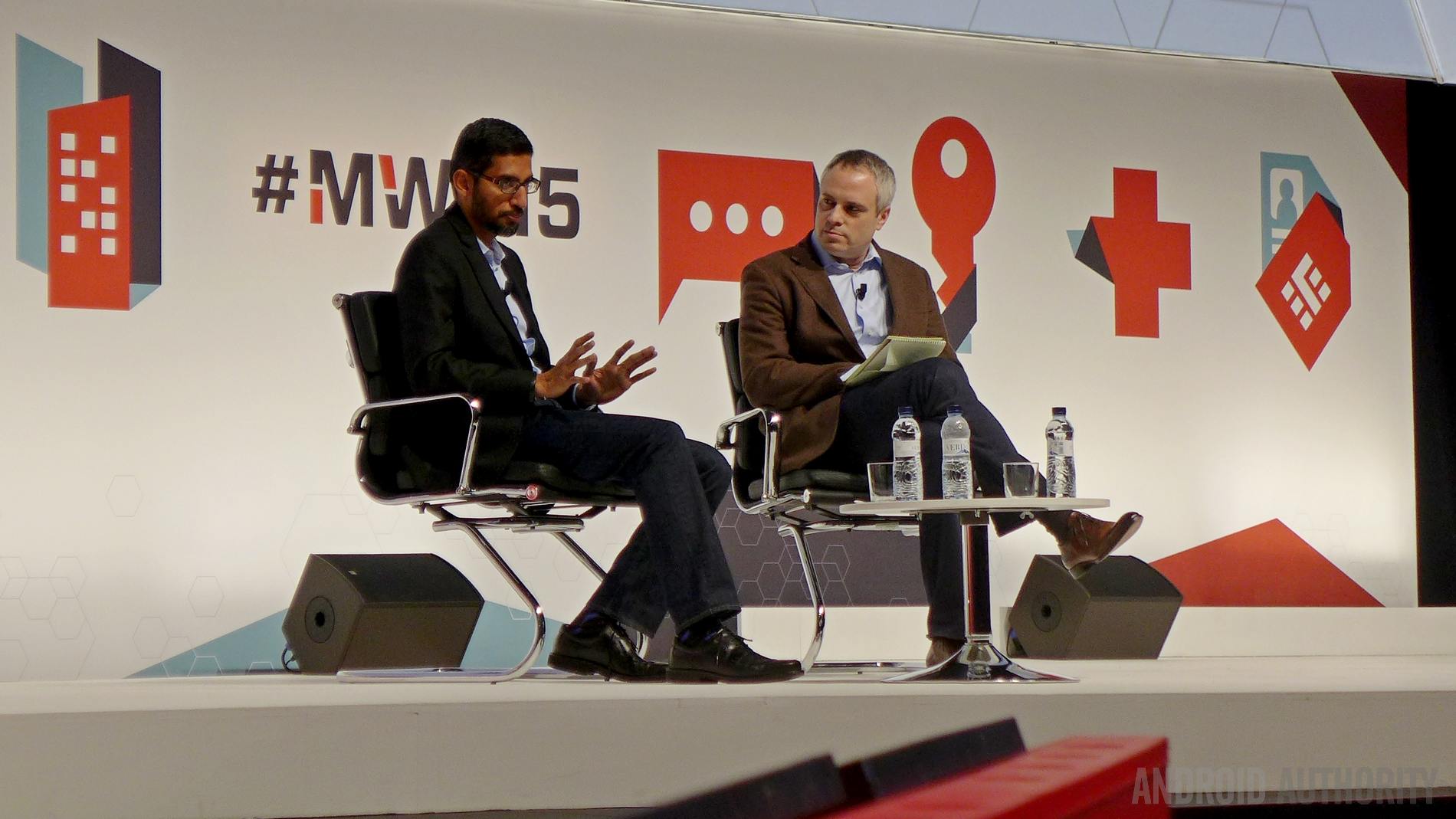Affiliate links on Android Authority may earn us a commission. Learn more.
Sundar Pichai on Galaxy S6, Cyanogen, Google Plus, VR, and more

Sundar Pichai, the product tsar of Google, took the stage at MWC today to talk about Google’s vision for the mobile word in 2015 and beyond. The executive addressed a crowd of mobile executives, professionals, and journalists eager to learn about Google’s near term plans, and Pichai didn’t disappoint. We already covered the announcement of Android Pay and Google’s MVNO, but there were lots of little nuggets in Pichai’s speech and the Q&A session that followed.
Here are the essential points of the keynote.
On Google’s strength in mobile
Google is all in on mobile – Pichai talked about the progresses that Google made in machine learning and cloud computing, and the impact these technologies have on mobile applications. The executive offered Translate as an example, a service that is used over a billion times every month by 500 million active users. But that’s just the tip of the iceberg – Google is using its machine learning and cloud computing expertise to solve problems for massive parts of the world’s population – just like Search scaled up to take over the world, Google wants to further scale up its mobile services.
Google wants to reach the current pool of mobile users (10 billion hours spent on mobile every month, one billion photos taken), but also wants to reach the billions that still aren’t online.
On “state of the art” Galaxy S6
Sundar Pichai expressed pride in the diversity of the Android ecosystem. He said he tested some of the $50 tablets available for sale over holidays, but also praised the Galaxy S6, which he pulled out of his pocket and showed to the audience. The exec praised the device, calling it “state of the art” in terms of design and hardware and said it brings together the best technologies available right now on mobile.
On the ecosystem
Low-end to top of the line, Google is dominating the industry, with one billion devices shipped in 2014 alone. Eight in every ten devices are Android. Android ships on devices from over a thousand companies.

On Android One
Despite reports suggesting otherwise, Pichai said Android One is a success, with Google’s partners having trouble meeting demand for the affordable devices. Android One phones from a dozen manufacturers are now on sale in six countries.
On Android as the foundation of modern tech
Google wants Android to be the “adhesive” that brings everything from phones, to TVs and cars, and smart homes together, for a seamless, clean user experience.
On Google’s internet plans
Like with many of its platforms, Google is going for large scale developments in the connectivity area, working with partners who want to build on top of its infrastructure.
Pichai talked about Google’s three major Access initiatives, which are meant to make Internet ubiquitous even in remote areas of the world. For urban coverage, Pichai mentioned Fiber, and said Project Link – Google’s fiber backbone deployment project in Kampala, Uganda, will be coming to more countries in Africa this year. For rural areas, Google is partnering with carriers like Vodafone or Telefonica to bring mobile internet access from Project Loon balloons, which are now able of staying airborne for six months and can beam LTE. Finally, Titan solar-powered planes will begin operating this year. Google wants to combine a constellation of drones and balloons to bring reliable access even in areas affected by disasters. But Google wants carriers to provide the actual service.
On his ever-expanding role at Google
During the Q&A session, Pichai said he’s still very much invested in Android, even though he now has a lot more on his plate. With that said, head of engineering Hiroshi Lockheimer is doing a lot in terms of leading day to day operations of the Android group.

On Android vs Apple
Pichai said he has a very positive view of Android and that Google anticipated the success Apple would have with larger devices. Still, Apple’s success doesn’t take away from Google, as the industry isn’t a zero sum game in Pichai’s view.
On Samsung
Samsung is a great company, said Pichai, who again praised the new Galaxy S6, even mentioning that TouchWiz is more focused this time around. Referring to the Microsoft apps that Samsung is preloading on the Galaxy S6, the executive simply said that it’s great to see Samsung offering what users want.
On China
Google is working with local companies to bring Play Store back to China, where there is clear demand, given the problems local Android users have with malware and low quality app store experiences. The Play Store may return to China in 2015, though that’s not a given.
On Cyanogen
Pichai abstained from making negative comments about Cyanogen, the company trying to “take away Android from Google.” However, he did say he doesn’t see value in offering Android without Google’s services, because users demand those. Google welcomes innovation, including from competitors, as long as it adds value. Pichai said he’s yet to try out a Cyanogen device.
On Google’s wireless service
Google is in talks with carriers to create its MVNO service. Rumored before, but only now officially confirmed, this service is meant to give an impulse to the ecosystem, in the way Nexus devices are meant to guide hardware partners towards Google’s vision. Google will start small and experiment, so carriers should not feel threatened. One goal of the project is to ensure connectivity to Android devices, from smartwatches to cars. More about that here.

On Android Pay
Pichai also confirmed Android Pay, an API layer built into Android that will let partners create their own payment services. Google’s own Wallet will use this layer, but anyone can join easily, because it will be standardized into Android. More about that here.
On virtual reality
Virtual reality is a hot field right now, and Google is happy that Android is at the foundation of many VR projects. Pichai said he thinks there are many use cases for VR, especially for solutions that weave computing into real life. He mentioned Magic Leap, the secretive startup that received massive investment from Google, as an example of a company doing good work in this field.
On Google Plus
After Google confirmed today the unbundling of Photos and Hangouts from Google Plus, Pichai confirmed that the “stream” is less important to Google, compared to the identity function. More energy will be put into Hangouts in the future.
On the future of Google
Until now, computing has been mostly about automating tasks, but Google is using VR, cloud technology, and especially machine learning to change that. Asked about the new stuff Google may talk about at MWC 2016, Pichai said the direction is towards delighting users with genuinely helpful, intelligent, and seamless functionality, as opposed to simple automation.
Stay tuned for more coverage from MWC 2015.